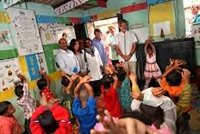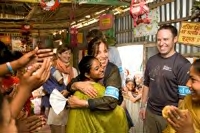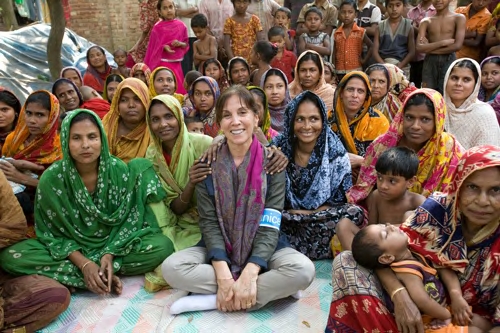|

|
| © UNICEF/2011/Saiful Huq Omi |
Ensuring
education
At a center for at-risk youth in Mirpur, close to 50 children between the ages of 5 and
15 gather every day. Almost 30 children, some as young as 4 years old, live in the Center, where they receive food, education,
health services, and life-skills training. These children had been living on their own, without families. In fact, before
coming to the center every one of them lived on the street.
On the day Mrs. Harrison and the UNICEF team visited the Center,
the children performed a play about child labor, a critical issue in Bangladesh that the country's society as a whole has yet to fully
respond to. The children have learned a lot since they began going to the center. When the delegation asked about child rights,
they all piped up: "We have a right to shelter, food, education, health and play!"
"These children are living a harsh reality,"
said Olivia Harrison. "But what is amazing to me is that all of them know their rights."
That same day, the UNICEF group
visited an open air school and met children who are living in makeshift shelters on a river embankment. These children are
involved in different kinds of informal jobs such as rag picking, collecting firewood or taking care of siblings at home when
their parents go to work. Their work keeps them from attending traditional school. But with the support of UNICEF, an "open
air school" is providing them with basic education and is helping prepare them for future enrollment in government primary
schools.
"I have learned the alphabet, numbers and rhymes," said an 8-year-old student named Hridoy. "I enjoy coming here."
Teaching
basic skills for brighter futures
To help another group of working children get access to education,
UNICEF is supporting a project known as the Basic Education for Urban Hard to Reach Working Children. The project is providing
education to 24 children who live in the Balur Basti slum and who are involved in different kinds of work. The children attend
two-and-half-hour sessions five days a week at a learning center. The school's curriculum is designed to address the
specific needs of these children, and classes focus on the basic education and life-skills they need to best deal with the
harsh realities of their lives. Despite those realities, all of the children at the school have dreams: some want to be doctors,
some engineers and others want to be teachers.
Sharmin Akhter, 11, is one of the students at the school. She lives with
her mother, three siblings and two nephews in a tiny room on a bamboo platform that houses 100 more families. Sharmin works
as a helper in a shop where she earns just $12 each month.
Sharmin and her older sister Nasima took a little time out
to chat with Olivia Harrison and Jonathan Clyde. Nasima told them that her husband and mother both work as assistants to a
local chef. But the monthly income for the whole family is only $42. The family struggles hard to live a decent life with
such a small amount of income. However, Nasima believes the school is helping her sister and other children in the area learn
vital basic skills that can go a long way toward improving their livelihoods.

|
| © UNICEF/2011/B. A. Sujan |
HIV/AIDS
awareness
Just east of Bangladesh’s capital, Dhaka, is the small town of Chouw. Here, the Kishori
Girls Club greeted Olivia Harrison and the UNICEF team with traditional songs and dances.
The children were discussing
HIV and AIDS that day. They are well aware of how to protect themselves against HIV, in fact, club members actually help promote
awareness publicly through drama performances in public places. Even though the prevalence rate of HIV and AIDS is less than
one percent in Bangladesh, there remains a significant degree of misconception among young people about the disease.
"This
is a unique opportunity," said Olivia Harrison, "where both boys and girls are mingling together, sharing ideas as friends
and discussing this important issue, which will help them to develop their confidence level and hopefully spare them from
an avoidable spread of HIV."
A
legacy of compassion for Bangladesh
Centers for at-risk children, schools for working children,
and life-skills clubs for adolescents are a just some of the initiatives that the George Harrison Fund for UNICEF is supporting
to help address the educational needs of Bangladesh's most vulnerable children.
In partnership with the government of
Bangladesh and other NGOs, UNICEF is working to prepare the young generation of the country for the challenges that lie ahead.
|






